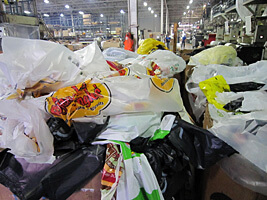
Are plastic bags getting a bad rap?
Look in almost any newspaper on any weekend and you will find an article about local governments that are considering taxing, banning or somehow regulating plastic bags. It is becoming undeservedly easy to hate the lowly plastic bag!
Paper vs. Plastic: Real Science
These articles usually leave out the facts as well as the comparison research. Take an honest look at what is required to produce 1000 plastic bags versus 1000 comparable paper bags. If the media would present the facts, as intelligent people we could make accurately informed decisions.
Keep in mind, Nashville Wraps sells both paper and plastic bags. In fact, we derive much more of our revenue from paper bags.
A factual comparison follows:
|
1000 Grocery Size Shopping Bags
|
||
|
Paper |
Plastic |
|
| Weight |
140 lbs.
|
15 lbs.
|
| Cubic Feet |
17.8 cu. feet
|
0.4 cu. feet
|
| Cost |
$230
|
$35
|
| Shipping |
$28
|
$3
|
| Total Cost |
$258
|
$38
|
| Diesel used in transit |
0.58 gallons
|
0.06 gallons
|
| Biodegradable? |
yes
|
yes
|
| Recyclable? |
yes
|
yes
|
| Air Emissions |
3.225 lbs. solids
|
1.62 lbs. solids
|
| Petroleum used |
3.67 lbs.
|
1.62 lbs.
|
| BTUs required |
1,629,000
|
649,000
|
| Indefinite recycled life? |
no
|
yes
|
| USA raw materials? |
yes
|
yes
|
| Shipping assumes truck freight at $20/cwt for 1,000 miles average. 6 mile per gallon hauling 40,000 lbs in a full truck load. Emission and BTU data from The University of Texas at Austin, Michigan Technological University, and the US Environmental Protection Agency 2001. Bags are compared with new materials. Plastic bags require less energy to collect and recycle than paper bags. | ||
What is the core problem with plastic bags?
Litter is the core issue because plastic bags of the past were slow to degrade or did not degrade at all. That was then, now plastic bags can be biodegradable. We do not have to ban a good product. A recent article in USA Today by Judy Keen states that litter is down in San Francisco due to the ban on grocery store PE bags. Is that true or are citizens more aware and acting more responsibly?
Are plastic bags made from foreign oil?
There is less foreign oil used to make plastic bags than there is to make paper ones, because less energy is required. True, some PE is made from oil derivatives; but examine the source of that PE resin. Years ago, Asian resin was used to make the plastic bags that we sold. Today the Asian governments no longer subsidize PE resin. Current sources are primarily domestic and derived from Natural Gas (ethane) and a by-product of the distillation of crude oil (foreign or domestic) but not the oil itself. Ethane is similar to propane, butane and other natural gases. Ethane Extraction is being revolutionized with outstanding new science. All of the plastic bags sold by Nashville Wraps are made in the USA with a minimum of 25% recycled plastics – some as high as 100%. Less and less new materials, ethane or otherwise are needed to manufacture plastic bags.
Recycling plastic versus paper bags
Plastic bags do not “down cycle”, meaning plastic bags can beget plastic bags ad infinitum. On the other hand, paper has a limited recyclable life span. The fibers break down too much after continued re-pulping. At the end of papers recyclable life it can be used in fillers and lower grade materials. Both paper and plastic are easy to recycle these days, paper just costs more and requires more energy to recycle. Plastic bags hit the re-grinder and in 45 minutes are new plastic bags. I have seen it happen.
Plastic bags made from corn?
We favor legislation that would require HDPE plastic bags under 1.0 mil to be degradable. (Nashville Wraps has already adopted this standard). Emphatically, PE (polyethylene) based and not PLA (corn based) plastic bags. PLA is not recyclable! It is “Compostable”. There is a huge difference. PLA bags would disrupt the recycling of normal PE plastic bags and initially they cost as much as paper. PLA is great for many products, just not grocery bags in our opinion.
PE bags are now bio-degradable
Without boring you will all the scientific data (it is available, see resources below) there is a new additive that we put into HDPE plastic grocery bags. It helps the PE molecules biodegrade. This process takes place aerobically or anaerobically. It takes place with or without the presence of light. These factors promote biodegradation even in landfill conditions which are normally not conducive to biodegradation. (See ECM Products Overview). Paper will biodegrade when oxygen and moisture are present neither of which are readily available in landfills.
Where does this leave us?
Well, now we know that neither paper or plastic bags are particularly bad, they just have different properties. Nashville Wraps favors responsible products, both paper and plastic when made in the USA from recycled US materials by emission reducing processes. It is just that simple.
The free market system works. Informed people make informed choices. Paper or plastic? You decide which is best for your needs as both are good and sustainable products.
R Meadows, Nashville Wraps
